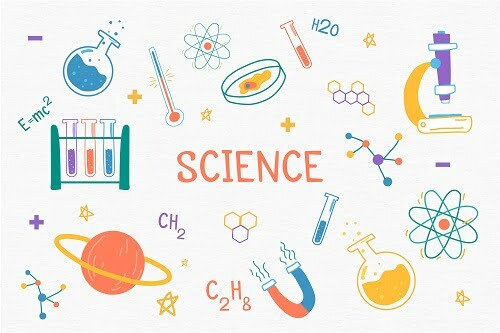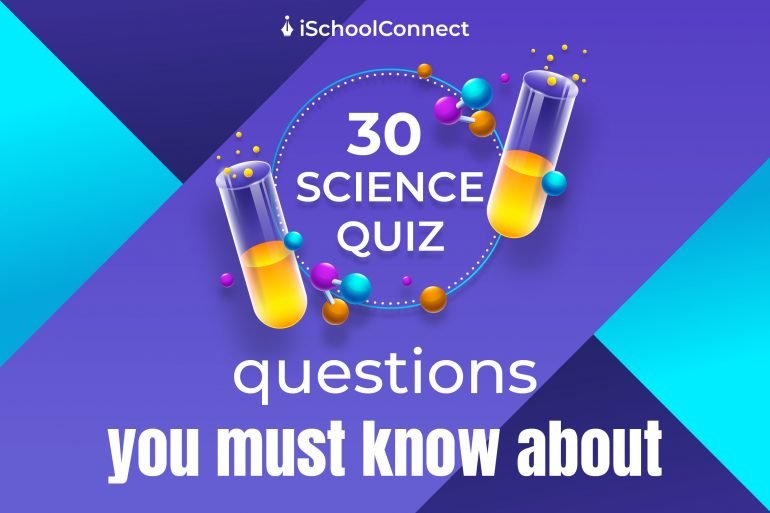Table of Contents
Science quiz | Check out these questions
Science is subject that strives to answer all the ‘What’s,’ ‘Where’s,’ ‘How’s,’ and ‘Why’s.’ From explaining something as natural as how it rains to delving into the depths of the universe, science is an interesting and engaging field pursued by millions of students around the globe.
Careers in science are recognized for offering the highest-paying jobs and most dynamic positions within the industry. For example, an average scientist’s salary in the United States is around USD 174,208 annually. This number is only expected to grow for those with the right knowledge, qualifications, and experience to make a career in the field.
To reach the phenomenal heights that this course can offer, you need to have a firm foundation in it. This begins with understanding the subject matter of most high-school science textbooks.
The best way to test your knowledge and understanding of science is by figuring out what your strengths and weaknesses are. To achieve this, you need to consistently practice previous year’s solved question papers and take quizzes.
Let’s have a look at 50 science quiz questions and begin your journey to a successful career in the field!
50 science quiz questions and answers
Testing your basics in science is key to recognizing the aspects that you need to work upon. These questions are designed to help you do just that!
Q1. What is an ecosystem?
Answer – An ecosystem is the living, and non-living factors of an environment put together.
Q2. What does hydroponics mean?
Answer – Hydroponics is the science of growing plants in a liquid medium.
Q3. What is the element with a minimum atomic number of 8 electrons in its outermost shell?
Answer – The element is neon.
Q4. What is the Zeeman Effect?
Answer – The Zeeman Effect is the splitting of spectral lines by a strong magnetic field.
Q5. What is the region of space around a nucleus called where there is a very high probability of finding an electron?
Answer – The region of space around a nucleus is the orbital.
Q6. Who is the centigrade system of measurement of temperature named after?
Answer – The centigrade system of measurement of temperature is named after Anders Celsius.
Q7. What is the Albedo Effect?
Answer – The reflectivity of the Earth’s surface is referred to as the Albedo Effect.
Q8. What is the average temperature of the Earth’s surface?
Answer – The average temperature of the Earth’s surface is 14o.C or 57oF.
Q9. What does an ornithologist study?
Answer – An ornithologist studies the behavior, migration patterns, and other related aspects of birds.
Q10. How many species of elephants are there?
Answer – There are 3 species of elephants – Asian, African Forest, and African Bush.
Q11. Who is the creator of the periodic table?
Answer – The creator of the periodic table is Dmitri Mendeleev.

Q12. Name the world’s largest reef system.
Answer – The world’s largest reef system is the Great Barrier Reef.
Q13. Who was the first astronaut?
Answer – The first astronaut was Yuri Gagarin.
Q14. In which part of the human body would we be able to find the hammer, anvil, and stirrup?
Answer – The hammer, anvil, and stirrup are in the “middle” ear.
Q15. Which muscle is the smallest in the human body?
Answer – The stapedius is the smallest muscle in the human body and is located in the middle ear.
Q16. What is the quantum number that gives us the shape of an atomic orbital?
Answer – The Azimuthal quantum number gives us the shape of an atomic orbital.
Q17. What are the two functional groups present within an ecosystem?
Answer – The two functional groups within an ecosystem are autotrophs and heterotrophs.
Q18. What is the technique of separation of cell components that are disrupted called?
Answer – This technique is called fractionation.
Q19. Name the atom that has a single electron.
Answer – The Hydrogen atom.
Q20. What is the full form of DNA?
Answer – DNA stands for deoxyribonucleic acid.

Q21. The maximum capacity of the d-orbital is?
Answer – The maximum capacity of the d-orbital is 10 electrons.
Q22. What is the instrument ‘barometer’ used to measure?
Answer – Atmospheric pressure.
Q23. Which of the 8 planets is the hottest planet in the solar system?
Answer – Venus is the hottest planet in the solar system, with a surface temperature of 470oC (878oF).
Q24. What material can move through electricity and heat?
Answer – A conductor.
Q25. What is the unit that is used to measure food energy?
Answer – A calorie.
Q26. What is the largest sea on the planet?
Answer – The largest sea on the planet is the Mediterranean sea. It covers an area of 1,144,800 square miles.
Q27. Which is the largest tree in the world?
Answer – The Giant Sequoia is the largest tree in the world.
Q28. Which is the fastest fish on the planet?
Answer – Sailfish.
Q29. What are the known atomic orbitals in an atom?
Answer – The atomic orbitals in an atom are called s, p, d, and f.
Q30. What is the name of the free-living bacteria in soil that fixes nitrogen?
Answer – The free-living bacteria in soil that fixes nitrogen is Azotobacter.
Q31. Who is the author of “A Brief History of Time?”
Answer- The book is written by a famous physicist – Stephen Hawking.
Q32. Tell the number of states of matter.
Answer- There are 4 states of matter: solid, liquid, plasma, and gas.
Q33. Which metal is known as the best conductor of electricity?
Answer- Silver
Q34. Are electrons smaller than atoms?
Answer- Yes
Q35. What freezes faster – hot water or cold water?
Answer- Hot water
Q36. Which is the farthest mountain peak from the center of the Earth?
Answer- Chimborazo
Q37. The Soviet Union launched the first man-made satellite in 1957. Name the satellite.
Answer- Sputnik 1
Q38. Name the world’s deepest ocean.
Answer- The pacific ocean
Q39. When did the Apollo 13 mission happen?
Answer- The mission took place in 1970.
Q40. Who is the father of Modern Chemistry?
Answer- Antoine Lavoisier
Q41. Name the two gases that cause acid rain.
Answer- Nitrogen oxides, Sulphur dioxide
Q42. Can Thermoplastics be recycled?
Answer- Yes
Q43. What is the chemical formula of Chile saltpeter?
Answer- NaNO3
Q44. Which is the rarest blood type in humans?
Answer- AB negative
Q45. Where is the smallest bone in the human body?
Answer- Ear
Q46. USB stands for ____
Answer- Universal Serial Bus
Q47. Name the type of lens used in a magnifying glass.
Answer- Convex lens
Q48. What is the number of colors in sunlight?
Answer- 7
Q49. Who was the first person to define speed?
Answer- Galileo Galilei
Q50. In how many minutes does the light from the Sun reaches Earth?
Answer- Approx. 8 minutes
Best mobile applications for Science quiz
Make learning Science fun by using some of the best apps, including-
-
Science News Daily
-
Periodic Table Quiz
-
WolframAlpha
-
Arduino Science Journal
-
NASA
-
Quizizz
Key takeaways
- Science has facilitated the growth and development of the human species.
- There are a number of careers within the field of science where aspirants can expect a high remuneration for their knowledge, skills, and expertise.
- To make the most of this subject, you need to have a firm foundation in the basics. Taking practice quizzes can help you develop this foundation.
- Practicing previous year’s question papers and attempting quizzes is an excellent way to understand your strong and weak areas within the subject.
We hope you liked this blog. If you did, be sure to leave a comment and share your thoughts. Get in touch with us if you have any doubts.
You may also enjoy reading- 7 Great scientists who will inspire you to pursue a career in science
FAQs
Q1. What are the different careers within the field of science?
Answer – Some of the most popular careers include Environmental Scientist, Epidemiologist, Biochemist, and Forensic Science Technician.
Q2. What are STEM subjects?
Answer – The STEM subjects are Science, Technology, Engineering, and Mathematics.
Q3. How much does an astronomer earn?
Answer – An astronomer’s salary begins with a base figure of USD 116,541.
Q4. Who is the father of Science?
Answer- Galileo Galilei is known as the Father of Science due to his experimental scientific methodologies and contribution to the scientific revolution.
Q5. What is the world’s most prestigious science competition?
Answer- Some of the top research Science competitions include-
-
MIT THINK Scholars Program
-
AAN Neuroscience Research Prize
-
Regeneron Science Talent Search
-
Davidson Fellows
-
Stockholm Junior Water Prize
Q6. What are the 3 types of Science?
Answers- The three branches of Science include physical Science, life science, and earth science.







